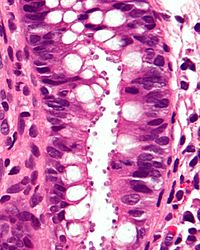
Photo from wikipedia
Background In this study, we aimed to investigate risk factors for the relapse of moderate and severe acute acalculous cholecystitis (AAC) patients after initial percutaneous cholecystostomy (PC) and to identify… Click to show full abstract
Background In this study, we aimed to investigate risk factors for the relapse of moderate and severe acute acalculous cholecystitis (AAC) patients after initial percutaneous cholecystostomy (PC) and to identify the predictors of patient outcomes when choosing PC as a definitive treatment for AAC. Materials and methods The study population comprised 44 patients (median age 76 years; range 31–94 years) with moderate or severe AAC who underwent PC without subsequent cholecystectomy. According to the results of follow-up (followed for a median period of 17 months), the data of patients with recurrence versus no recurrence were compared. Patients were divided into the death and non-death groups based on patient status within 60 days after PC. Results Twenty-one (47.7%) had no recurrence of cholecystitis during the follow-up period after catheter removal (61–1348 days), six (13.6%) experienced recurrence of cholecystitis after PC, and 17 (38.6%) patients died during the indwelling tube period (5–60 days). The multivariate analysis showed that coronary heart disease (CHD) or congestive heart failure (odds ratio [OR] 26.50; 95% confidence interval [CI] 1.21–582.06; P = 0.038) was positively correlated with recurrence. The age-adjusted Charlson comorbidity index (OR 1.53; 95% CI 1.08–2.17; P = 0.018) was independently associated with 60-day mortality after PC. Conclusions Our results suggest that CHD or congestive heart failure was an independent risk factor for relapse in moderate and severe AAC patients after initial PC. AAC patients with more comorbidities had worse outcomes.
Journal Title: BMC Surgery
Year Published: 2021
Link to full text (if available)
Share on Social Media: Sign Up to like & get
recommendations!